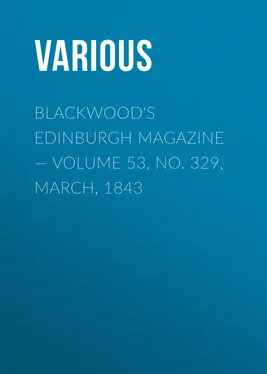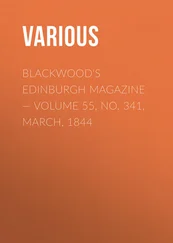Various - Blackwood's Edinburgh Magazine — Volume 53, No. 329, March, 1843
Здесь есть возможность читать онлайн «Various - Blackwood's Edinburgh Magazine — Volume 53, No. 329, March, 1843» — ознакомительный отрывок электронной книги совершенно бесплатно, а после прочтения отрывка купить полную версию. В некоторых случаях можно слушать аудио, скачать через торрент в формате fb2 и присутствует краткое содержание. Издательство: Иностранный паблик, Жанр: foreign_antique, periodic, foreign_edu, на английском языке. Описание произведения, (предисловие) а так же отзывы посетителей доступны на портале библиотеки ЛибКат.
- Название:Blackwood's Edinburgh Magazine — Volume 53, No. 329, March, 1843
- Автор:
- Издательство:Иностранный паблик
- Жанр:
- Год:неизвестен
- ISBN:нет данных
- Рейтинг книги:3 / 5. Голосов: 1
-
Избранное:Добавить в избранное
- Отзывы:
-
Ваша оценка:
- 60
- 1
- 2
- 3
- 4
- 5
Blackwood's Edinburgh Magazine — Volume 53, No. 329, March, 1843: краткое содержание, описание и аннотация
Предлагаем к чтению аннотацию, описание, краткое содержание или предисловие (зависит от того, что написал сам автор книги «Blackwood's Edinburgh Magazine — Volume 53, No. 329, March, 1843»). Если вы не нашли необходимую информацию о книге — напишите в комментариях, мы постараемся отыскать её.
Blackwood's Edinburgh Magazine — Volume 53, No. 329, March, 1843 — читать онлайн ознакомительный отрывок
Ниже представлен текст книги, разбитый по страницам. Система сохранения места последней прочитанной страницы, позволяет с удобством читать онлайн бесплатно книгу «Blackwood's Edinburgh Magazine — Volume 53, No. 329, March, 1843», без необходимости каждый раз заново искать на чём Вы остановились. Поставьте закладку, и сможете в любой момент перейти на страницу, на которой закончили чтение.
Интервал:
Закладка:
"Here is the cause of all the mischief, Ammalát!" said the Captain, angrily, pointing to the Khan; "but for this insolent rebel not a trigger would have been pulled in Bouináki! But you have done well, Ammalát Bek, to invite Russians as friends, and to receive their foe as a guest, to shelter him as a comrade, to honour him as a friend! Ammalát Bek, this man is named in the order of the commander-in-chief; give him up."
"Captain," answered Ammalát, "with us a guest is sacred. To give him up would be a sin upon my soul, an ineffaceable shame upon my head; respect my entreaty; respect our customs."
"I will tell you, in your turn—respect the Russian laws. Remember your duty. You have sworn allegiance to the Tsar, and your oath obliges you not to spare your own brother if he is a criminal."
"Rather would I give up my brother than my guest, Sir Captain! It is not for you to judge my promises and obligations. My tribunal is Allah and the padishah! In the field, let fortune take care of the Khan; but within my threshold, beneath my roof, I am bound to be his protector, and I will be!"
"And you shall be answerable for this traitor!"
The Khan had lain in haughty silence during this dispute, breathing the smoke from his pipe: but at the word "traitor," his blood was fired, he started up, and rushed indignantly to the Captain.
"Traitor, say you?" he cried. "Say rather, that I refused to betray him to whom I was bound by promise. The Russian padishah gave me rank, the sardar 35 35 The commander-in-chief.
caressed me—and I was faithful so long as they demanded of me nothing impossible or humiliating. But, all of a sudden, they wished me to admit troops into Avár—to permit fortresses to be built there; and what name should I have deserved, if I had sold the blood and sweat of the Aváretzes, my brethren! If I had attempted this, think ye that I could have done it? A thousand free daggers, a thousand unhired bullets, would have flown to the heart of the betrayer. The very rocks would have fallen on the son who could betray his father. I refused the friendship of the Russians; but I was not their enemy—and what was the reward of my just intentions, my honest counsels? I was deeply, personally insulted by the letter of one of your generals, whom I had warned. That insolence cost him dear at Báshli ... I shed a river of blood for some few drops of insulting ink, and that river divides us for ever."
"That blood cries for vengeance!" replied the enraged Captain. "Thou shalt not escape it, robber!"
"Nor thou from me!" shouted the infuriated Khan, plunging his dagger into the body of the Captain, as he lifted his hand to seize him by the collar. Severely wounded, the officer fell groaning on the carpet.
"Thou hast undone me!" cried Ammalát, wringing his hands. "He is a Russian, and my guest!"
"There are insults which a roof cannot cover," sullenly replied the Khan. "The die is cast: it is no time to hesitate. Shut your gate, call your people, and let us attack the enemy."
"An hour ago I had no enemy ... there are no means now for repulsing them ... I have neither powder nor ball ... The people are dispersed."
"They have fled!" cried Saphir-Ali in despair. "The Russians are advancing at full march over the hill. They are close at hand!"
"If so, go with me, Ammalát!" said the Khan. "I rode to Tchetchná yesterday, to raise the revolt along the line ... What will be the end, God knows; but there is bread in the mountains. Do you consent?"
"Let us go!" ... replied Ammalát, resolvedly.... "When our only safety is in flight, it is no time for disputes and reproaches."
"Ho! horses, and six noúkers with me!"
"And am I to go with you?" said Saphir-Ali, with tears in his eyes—"with you for weal or woe!"
"No, my good Saphir-Ali, no. Remain you here to govern the household, that our people and the strangers may not seize every thing. Give my greeting to my wife, and take her to my father-in-law, the Shamkhál. Forget me not, and farewell!"
They had barely time to escape at full gallop by one gate, when the Russians dashed in at the other.
CHAPTER II
The vernal noon was shining upon the peaks of Caucasus, and the loud voices of the moollahs had called the inhabitants of Tchetchná to prayer. By degrees they came forth from the mosques, and though invisible to each other from the towers on which they stood, their solitary voices, after awaking for a moment the echoes of the hills, sank to stillness in the silent air.
The moollah, Hadji Suleiman, a Turkish devotee, one of those missionaries annually sent into the mountains by the Divan of Stamboul, to spread and strengthen the faith, and to increase the detestation felt by the inhabitants for the Russians, was reposing on the roof of the mosque, having performed the usual call, ablution, and prayer. He had not been long installed as moollah of Igáli, a village of Tchetchná; and plunged in a deep contemplation of his hoary beard, and the circling smoke-wreaths that rose from his pipe, he gazed from time to time with a curious interest on the mountains, and on the defiles which lay towards the north, right before his eyes. On the left arose the precipitous ridges dividing Tchetchná from Avár, and beyond them glittered the snows of Caucasus; sáklas scattered disorderly along the ridges half-way up the mountain, and narrow paths led to these fortresses built by nature, and employed by the hill-robbers to defend their liberty, or secure their plunder. All was still in the village and the surrounding hills; there was not a human being to be seen on the roads or streets; flocks of sheep were reposing in the shade of the cliffs; the buffaloes were crowded in the muddy swamps near the springs, with only their muzzles protruded from the marsh. Nought save the hum of the insects—nought save the monotonous chirp of the grasshoppers indicated life amid the breathless silence of the mountains; and Hadji Suleiman, stretched under the cupola, was intensely enjoying the stillness and repose of nature, so congenial to the lazy immobility of the Turkish character. Indolently he turned his eyes, whose fire was extinguished, and which no longer reflected the light of the sun, and at length they fell upon two horsemen, slowly climbing the opposite side of the declivity.
"Néphtali!" cried our Moollah, turning towards a neighbouring sákla, at the gate of which stood a saddled horse. And then a handsome Tchetchenetz, with short cut beard, and shaggy cap covering half his face, ran out into the street. "I see two horsemen," continued the Moollah; "they are riding round the village!"
"Most likely Jews or Armenians," answered Néphtali. "They do not choose to hire a guide, and will break their necks in the winding road. The wild-goats, and our boldest riders, would not plunge into these recesses without precaution."
"No, brother Néphtali; I have been twice to Mecca, and have seen plenty of Jews and Armenians every where. But these riders look not like Hebrew chafferers, unless, indeed, they exchange steel for gold in the mountain road. They have no bales of merchandise. Look at them yourself from above; your eyes are surer than mine; mine have had their day, and done their work. There was a time when I could count the buttons on a Russian soldier's coat a verst off, and my rifle never missed an infidel; but now I could not distinguish a ram of my own afar."
By this time Néphtali was at the side of the Moollah, and was examining the travellers with an eagle glance.
"The noonday is hot, and the road rugged," said Suleiman; "invite the travellers to refresh themselves and their horses: perhaps they have news: besides, the Koran commands us to show hospitality."
"With us in the mountains, and before the Koran, never did a stranger leave a village hungry or sad; never did he depart without tchourek, 36 36 A kind of dried bread.
without blessing, without a guide; but these people are suspicious: why do they avoid honest men, and pass our village by by-roads, and with danger to their life?"
Интервал:
Закладка:
Похожие книги на «Blackwood's Edinburgh Magazine — Volume 53, No. 329, March, 1843»
Представляем Вашему вниманию похожие книги на «Blackwood's Edinburgh Magazine — Volume 53, No. 329, March, 1843» списком для выбора. Мы отобрали схожую по названию и смыслу литературу в надежде предоставить читателям больше вариантов отыскать новые, интересные, ещё непрочитанные произведения.
Обсуждение, отзывы о книге «Blackwood's Edinburgh Magazine — Volume 53, No. 329, March, 1843» и просто собственные мнения читателей. Оставьте ваши комментарии, напишите, что Вы думаете о произведении, его смысле или главных героях. Укажите что конкретно понравилось, а что нет, и почему Вы так считаете.












